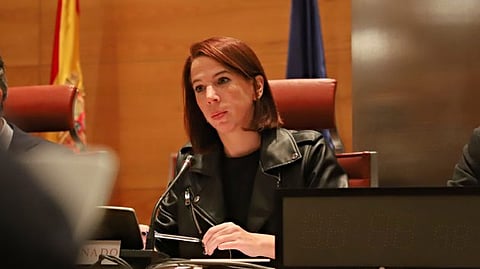

Senator Paula Somalo, representative of the Spanish Socialist Workers Party (PSOE), currently in the Government of Spain, was the promoter of the motion.
Photo: PSOE.
With 29 votes in favor and only one abstention, the Fisheries Commission of the Spanish Senate has approved this week a motion urging the Spanish Government to promote professional and university training in the field of aquaculture. This major agreement highlights the importance of this industry in Spain.
"Supporting aquaculture is backing the future of the primary sector. It is supporting a blue, strong, sustainable, and innovative economy. It is supporting quality employment and real food sovereignty," said Senator Paula Somalo, representative of the Spanish Socialist Workers Party (PSOE), currently in the Government of Spain, who was the promoter of the motion.
The motion proposes to develop specific training in the sector of vocational training and universities, to promote R+D+i, to strengthen collaboration between educational institutions and companies, and to promote the creation of centers of excellence. As a result of this investment effort, the training of more than 10,000 aquaculture professionals will be promoted.
Although the initiative is a measure for the future, in her speech presenting the proposal, Senator Somalo recalled that aquaculture is present in Spain, a present generating employment, creating wealth on the coast, in rural areas, and ensuring the supply of quality fish products.
As she highlighted, Spain leads the aquaculture production of the European Union, with almost 273,000 tons produced in 2023 and a value of more than EUR 809 million. The sector already directly employs more than 10,200 people in the country, many of them in Galicia.
"Spain, as a European leader in this field, must continue to move forward to ensure generational replacement," Somalo said, calling for a vote in favor of the motion to ensure the sector's sustainability.
"We must consolidate these advances and ensure that new generations have the training and resources necessary to maintain and improve this activity. Because without training, there is no generational replacement, and without generational replacement, there is no future for the primary sector," she continued.
The Socialist senator, who insisted that Spain cannot allow the loss of young talent due to lack of opportunities, noted that training is key to ensuring a strong and competitive aquaculture sector. "Aquaculture can and must be an attractive sector for young talent, a space for innovation, sustainability and growth," she said.
Senator Somalo - as mentioned, a member of the governing party - also said that the Spanish Ministry of Agriculture, Fisheries and Food is clear about the importance of aquaculture as a strategic sector for guaranteeing the country's food autonomy, and presented the motion as a response to a strategic challenge for the future of the primary sector.
The industry, she said, needs solutions and politicians to be more creative, to go beyond speeches and move from words to deeds, with investments and strategies, and with specific actions: research funding, specialized training, development of sustainable technologies, and promotion of the much-needed generational change.
"The challenges facing aquaculture are not minor, environmental sustainability, climate change adaptation, access to water and space, species diversification, health, and animal welfare are some of them. These are complex challenges that require sound public policies, financial commitment, and close collaboration between the sector and the scientific community," she stated.
As several members of the Fisheries Commission of the Spanish Senate reminded Senator Paula Somalo during the session, turning this motion into a reality requires the commitment and collaboration of all administrations: state, regional, and local. Especially when in Spain, both aquaculture and training are the exclusive competence of the Autonomous Regions, most of which are governed by parties other than the central government.
As we have seen in the case of some recent news such as the support of the Government of Cantabria to the first land-based Atlantic salmon farm in the country, or of the Government of Asturias to the land-based sole farm of Sea Eight, these regional administrations are already supporting the aquaculture sector.
The mover of the motion agreed with that support. "We need a long-term vision that guarantees the viability of the sector with backing from all levels of government, from state to autonomous and local," Somalo said.
With a totally polarized political panorama in which the different parties hardly reach agreements, the fact that this motion was approved almost unanimously - just the only representative in the Commission of VOX, the Spanish far-right party, abstained - highlights the importance of aquaculture for the future of the seafood industry and of the country itself.
